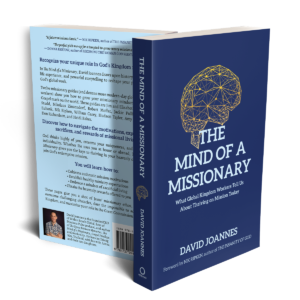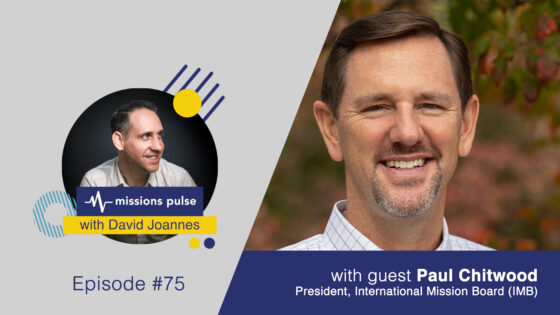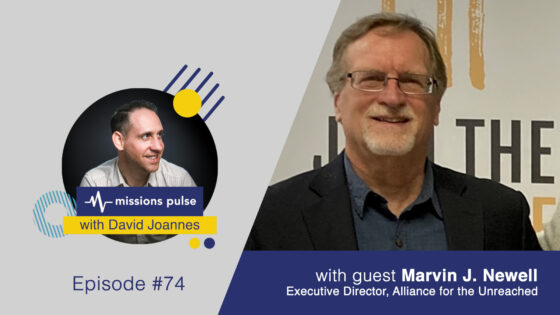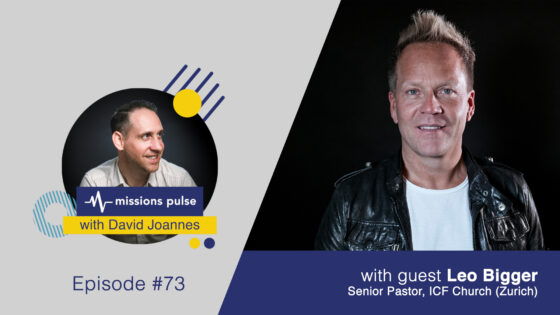Global Kingdom worker: Don Richardson
Role in The Mind of a Missionary: He appears in section four: Rewards, chapter eleven: Breakthrough in Ministry.
Dates: 1935—present
Location of missions work: Western New Guinea, Indonesia
Known for: Don Richardson is a Canadian Christian missionary, teacher, author and international speaker who worked among the tribal people of Western New Guinea, Indonesia.
Famous quotes: “God has been sovereignly working in a preparatory way by seeding cultures worldwide with foreshadowings of the Savior.”1
“We are not here to loll and frolic but to bring in a harvest for God.”
In The Mind of a Missionary, section four: Rewards, chapter eleven: Breakthrough in Ministry, your perception about culture will change as you see through the eyes of Don Richardson. Sometimes you witness the fallen aspects of social behavior and wonder if God is in the midst of a people or community. But when you recognize the fingerprints of God on culture—what Don Richardson calls “redemptive analogy”—you find that beauty is under the surface. Your task is to present Kingdom values in a manner that is relevant to your listeners. Culture often seems at odds with the Kingdom of God. But every culture carries a certain facet of God’s glory. As you learn to become a student of culture and grow ever closer to the heart of Jesus, He empowers you to witness breakthrough in your missional efforts. Through the example of Don Richardson’s missionary service, you will see that Kingdom breakthrough is available to you as well.
Reports of the treacherous terrain, cruel climate, and bloodthirsty inhabitants pricked up Richardson’s ears. Twenty-two feet of rainfall descended each year over the region. The mosquito-infested swamps mushroomed with malaria. Giant crocodiles, poisonous snakes, and blood-sucking leeches were of less concern than the cannibalistic headhunters. But Richardson welcomed the invitation to serve in the tough field. After two days of waiting on God in prayer, the Richardsons gave their answer: “Yes, we are happy to go to one of the tribes in the south!” they said. “How soon can we leave?”2
Satan understands the conclusion of God’s narrative, often more than we do. He knows his end; his days are marked. Compelled to establish the Kingdom of God where it is still unknown, Christ’s followers advance confidently into the shadowlands, certain that the victory is theirs.3
On May 19, 1962, Don, Carol, and six-month-old Stephen soared over the mighty ranges of Mount Wilhelmina, awed as they suddenly dropped from altitudes of fifteen-thousand feet down to sea level. God’s fingerprints evidenced in the panorama, proof that His presence predated their arrival. Their hearts thumped with nervous enthusiasm. Somewhere below, in the shimmering stretch of emerald grasslands, graceful palms, and dense sago thickets, they were to build a home and live among a cannibal-headhunter tribe.
The wilderness of the locale seemed to taunt Richardson. Something in the mood of the place seemed to mock, “I am not like your tame, manageable Canadian homeland. I am tangled.” The canoe drifted past the twisted vines and sago thorns that lined the dense banks, skirting death adders and taipans, leeches and crocodiles. The taunting whispers continued: “Your idealism means nothing here. Your Christian Gospel has never scrupled the conscience of my children. You think you love them, but wait until you know them, if you can ever know them!” Don was not worried for his safety, but thoughts about his family coursed through his mind. The region thronged with malaria and dysentery, filariasis and hepatitis. “Think again, before you commit yourself to certain disillusionment!” the voices seemed to continue. “Can’t you see I am no place for your wife? I am no place for your son. I am no place for you.”4
Publicizing the name of Jesus to elicit worshippers from every nation, tribe, people, and language is no easy task. The reward of ministry breakthrough will not transpire without daring risk and steadfast missionary grit.5
The villages of Kamur and Haenam had previously been at war. They tried to forget the grievances of the past—the trickery and treachery, murder and cannibalism between them—but soon hostility broke out. A steady release of arrows arced overhead, slicing the ground near the Richardson’s thatch box dwelling. “Carol,” Don shouted, “Keep Stephen away from the windows!”
Amidst the din that surrounded him, a voice seemed to whisper, “Blessed are the peacemakers, for they shall be called the children of God.” Richardson dashed from behind the hut onto the battleground. He urged the Sawi to stop fighting. The Sawi tribesmen glistened with perspiration and rage. Warpaint streaked across their faces; with clamped fists, they clenched swords and spears. “Making peace is not a simple thing,” they said. “We shed each other’s blood, devour each other’s flesh, cut off heads, and save skulls as trophies. When these things have happened, making peace is not the simple thing you seem to think it should be.” It seemed there was no means of conflict resolution.
Contextualization is not only the task of the global Kingdom worker. We are all called to present the Gospel in a culturally relevant way, thus highlighting and not diminishing its potency.6
Don Richardson found a key to the Sawi’s salvation. Embedded in their culture was the value for peace as seen through the “peace child.” As he utilized this means of sharing the Gospel message, great breakthrough came to his missionary efforts.
Our job as believers is to give witness of God’s glory in a culturally relevant manner; to unearth the cultural compasses that speak to the hearts and minds of our hearers.7
On June 23, 2012, fifty-year-old Steve Richardson boarded a propeller plane bound for Kamur Village on the southern tip of New Guinea. His destination: the same Sawi settlement where his parents had taken him as a seven-month-old baby. Steve’s two brothers, Shannon and Paul, joined him on the journey. Their seventy-seven-year-old father, Don Richardson, boarded the plane with them. “It’s been fifty years since that day,” Steve said, referring to the time Hato met the Peace Child, Jesus. His words kick off the riveting narrative in a documentary entitled Never the Same.8 “We are very anxious to see how the Sawi are doing.”
You must cultivate your awareness of the spiritual, social, and cultural milieu around you. Culture is alive and ever-changing; like fermenting wine, it breathes. It cannot remain for too long in old wineskins; it threatens to burst apart at the seams. The present age is pregnant with potential, necessitating new wineskins and an unconventional modus operandi for mission.9
The Christian worldview penetrated every facet of Sawi culture; they are now an evangelistic witness to former enemy communities. In June 2012, the Sawi of Kamur invited two thousand people from thirty-seven villages representing five neighboring tribes to join them in celebration. Don officiated a mass wedding ceremony for 102 couples and dedicated 130 new babies to the Lord. The same day, 325 Sawi joined a public baptism. Fifteen groups of twenty-five new believers each waded into the river, closed their eyes, and lifted their hands in prayer; Don personally baptized fifteen people. Joshua Project, a research initiative that highlights ethnic peoples worldwide, now estimates the Sawi Christian population at eighty-five percent.10
Do you wish to witness the transformative power of the Gospel through your missional efforts? You must become a student of culture and a master of metamorphosis. You must meet people where they are and thus prove your concern for them. The age-old proverb rings true today: People don’t care how much you know until they know how much you care.
As Christians, our task is to help shed light on the splendor of God’s original intention: His salvation available to every nation, tribe, people, and language. In chapter eleven of The Mind of a Missionary, you will see that this is not merely the job of foreign missionaries. Global Kingdom workers tell us that every member of the body of Christ is a minister. If we serve a God who bestows upon His creation a crown of beauty instead of ashes, the oil of joy instead of mourning, and a garment of praise instead of a spirit of despair, it follows that His people do likewise.
The Mind of a Missionary: What Global Kingdom Workers Tell Us About Thriving on Mission Today by David Joannes
Books/resources:
Peace Child: An Unforgettable Story of Primitive Jungle Treachery in the 20th Century by Don Richardson
Books/resources referenced in chapter eleven of The Mind of a Missionary:
God of the Thai: How One Movement Overcomes the Perception of a Foreign God by Jiraphon Serithai
John 3:16 from a Thai Buddhist Worldview—Total Opposite! by Philip Bassham
Christ and Culture by H. Richard Niebuhr
Never The Same: Celebrating 50 Years Since Peace Child (video)
Joshua Project, Sawi progress report
If you like The Mind of a Missionary, you’ll love the companion devotional. Pick up your copy today!
- A messaged entitled “Cultural Compasses that Point to Jesus,” presented on January 12, 2014, by Don Richardson at Stonebridge Church, Cedar Rapids, IA, USA https://youtu.be/GDf3HpC9yms
- Don Richardson, Peace Child: An Unforgettable Story of Primitive Jungle Treachery in the 20th Century, page 90 Regal Books, 1976
- David Joannes, The Mind of a Missionary: What Global Kingdom Workers Tell Us About Thriving on Mission Today, chapter eleven: Breakthrough in Ministry
- Don Richardson, Peace Child: An Unforgettable Story of Primitive Jungle Treachery in the 20th Century, page 96-97 Regal Books, 1976
- David Joannes, The Mind of a Missionary: What Global Kingdom Workers Tell Us About Thriving on Mission Today, chapter eleven: Breakthrough in Ministry
- David Joannes, The Mind of a Missionary: What Global Kingdom Workers Tell Us About Thriving on Mission Today, chapter eleven: Breakthrough in Ministry
- David Joannes, The Mind of a Missionary: What Global Kingdom Workers Tell Us About Thriving on Mission Today, chapter eleven: Breakthrough in Ministry
- Never The Same: Celebrating 50 Years Since Peace Child, Pioneers USA Youtube channel https://youtu.be/mm6R9EPtMHo
- David Joannes, The Mind of a Missionary: What Global Kingdom Workers Tell Us About Thriving on Mission Today, chapter eleven: Breakthrough in Ministry
- Joshua Project, Sawi progress report https://joshuaproject.net/people_groups/18881/ID

















